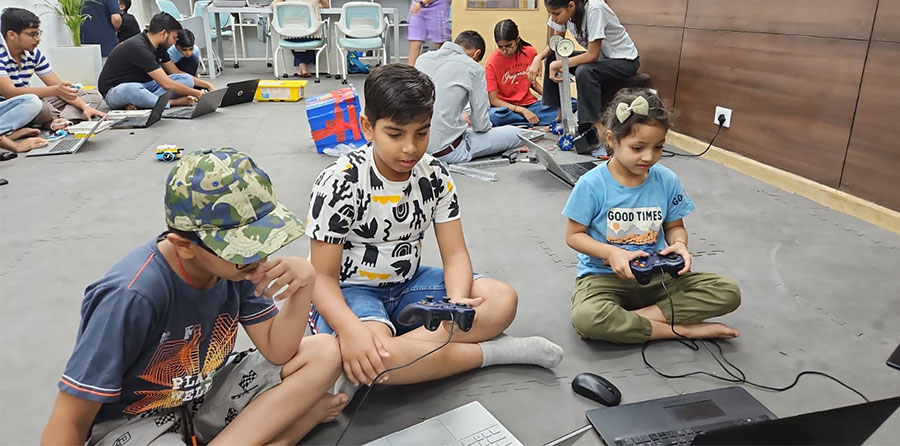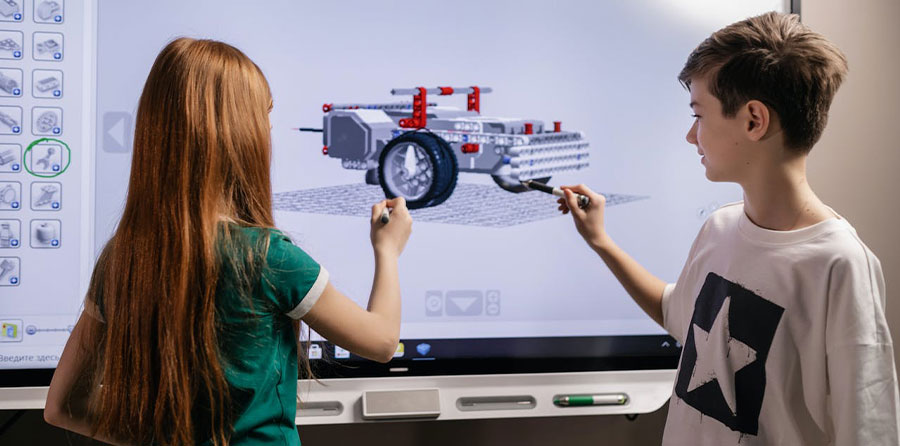Project-Based Learning
Project-based learning (PBL) is a teaching approach that engages students in designing, developing, and constructing hands-on solutions to real-world problems. The goal of Project-based learning is to provide students with opportunities to develop their critical thinking, problem-solving, collaboration, and communication skills in an authentic context.
In Project-based learning, students work in small teams to identify and explore a complex question, challenge, or issue that requires an interdisciplinary approach. They conduct research, analyze data, synthesize information, generate ideas, design prototypes, and test their solutions in a hands-on way. Throughout the process, they receive feedback, revise their work, and reflect on their learning.
At STEAM Varsity, The educational value of PBL is that it helps students develop a growth mindset as they learn to embrace challenges, persist through difficulties, and learn from mistakes. PBL also promotes student engagement, as it allows students to take ownership of their learning and pursue topics that are relevant to their interests and passions. Project-based learning fosters a sense of community and social responsibility, as students learn to collaborate, communicate, and empathize with others while addressing real-world problems. PBL is a powerful teaching strategy that can transform the way students learn and prepare for the challenges of the 21st century.
Why is project-based learning important?
Project-based learning (PBL) is an educational approach that is gaining popularity in schools around the world. In PBL, students work on extended projects that are designed to engage them in real-world problems and challenges. Let's explore the reasons why Project-Based Learning (PBL) is crucial for a student's academic growth and development.
- Deeper understanding
- Improved problem-solving skills
- Enhanced teamwork and communication skills
- Increased motivation and engagement
- PBL is hands-on and active
- In PBL, students have a choice in what they learn and how they learn it
How does project-based learning differ from “Doing A Project”?
Project-Based Learning is a teaching approach that emphasizes active and collaborative learning, problem-solving, critical thinking, and student-centeredness. It differs from simply "doing a project" in that PBL involves a more in-depth, inquiry-based process where students explore real-world problems and challenges, and work to develop solutions or products that demonstrate their understanding and skills.
PBL projects typically involve a series of steps, such as brainstorming, research, planning, creating, testing, and presenting, and often require students to apply knowledge from multiple subject areas. In contrast, a conventional project may focus more on following directions and completing a set task, without necessarily requiring students to engage in higher-order thinking or creativity.
Benefits of project-based learning
At STEAM Varsity Project-Based Learning (PBL) has numerous benefits for students. By engaging in projects, students acquire crucial skills such as critical thinking, problem-solving, collaboration, and communication. They learn how to apply theoretical knowledge to practical situations, which enhances their comprehension and retention of the concepts. PBL also promotes creativity and autonomy by granting students more freedom to explore and experiment with ideas.
PBL encourages students to take responsibility for their learning, which is an indispensable skill for their future academic and professional endeavors. In summary, PBL is a valuable pedagogical tool that equips students with essential competencies and cultivates their sense of ownership over their learning.
Characteristics of project-based learning
Project-Based Learning (PBL) is a teaching method that involves students working on a project over an extended period. There are several characteristics of PBL that distinguish it from conventional classroom learning.
- It is student-centered, meaning that students drive the learning process by asking questions, conducting research, and collaborating with their peers.
- PBL is interdisciplinary, which means that it covers multiple subjects and topics. Projects may involve science, math, social studies, and language arts, among other subjects.
- It is designed to be relevant to the real world. Projects often involve solving authentic problems or creating real-world products, which helps students to see the practical application of their learning.
- PBL is collaborative, meaning that students work in teams or groups to complete the project. This promotes communication, teamwork, and interpersonal skills.
- PBL is inquiry-based, which means that it is driven by students' questions and curiosity. Teachers act as facilitators, guiding students in their learning and providing support as needed.
How can project-based learning help students?
This particular activity is designed to provide an opportunity for a child to showcase his/her skills and abilities while working independently. It allows the child to take ownership of his work and demonstrate their capability to apply desired skills such as conducting research, gathering relevant information, and presenting it in a comprehensive manner.
This activity is not only beneficial for enhancing the child's academic performance but also for his/her social and interpersonal skills. It encourages the child to work with their peers, building teamwork and collaboration skills. This, in turn, helps them to develop a healthy and positive relationship with their peers, and also prepares them for real-life situations where they will need to work with others towards a common goal. It can also be an effective way for developing a child's self-confidence, independence, research skills, social, and interpersonal skills.
How STEAM Varsity can help for project-based learning (PBL)
Implementing project-based learning can be complex, especially if you're trying to set up everything by yourself. However, with the help of STEAM Varsity, it becomes simple and hassle-free. We offer project-based learning managed services that can help you find the best program for your students and connect them with industry leaders. Our dedicated team provides continuous support in our programs with a committed program manager to ensure that your students get the most out of their learning experience.
Our fully supported and quality-assured programs are designed to connect university students with genuine industry experiences, internships, and projects. We curate these programs from thousands of global employers, including government departments, corporate, and community organizations. We understand the importance of virtual delivery of PBL programs, and that's why we offer our programs virtually. Our innovative and user-friendly platform is designed to optimize learning quality and the student experience, regardless of whether the programs are used onsite or remotely.

Have queries?
Contact us anytime.




